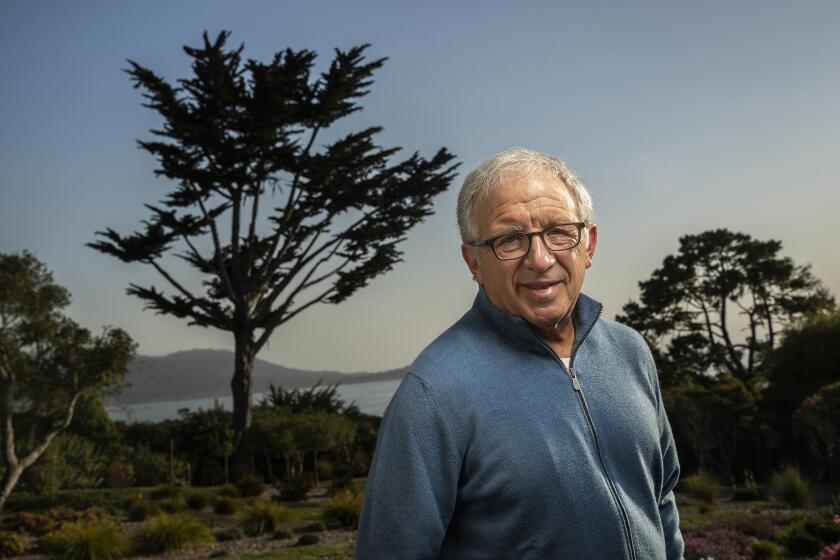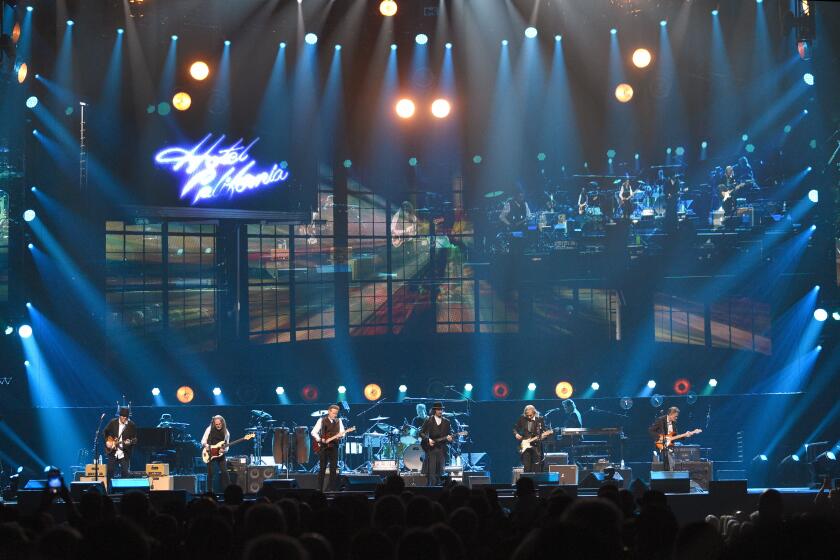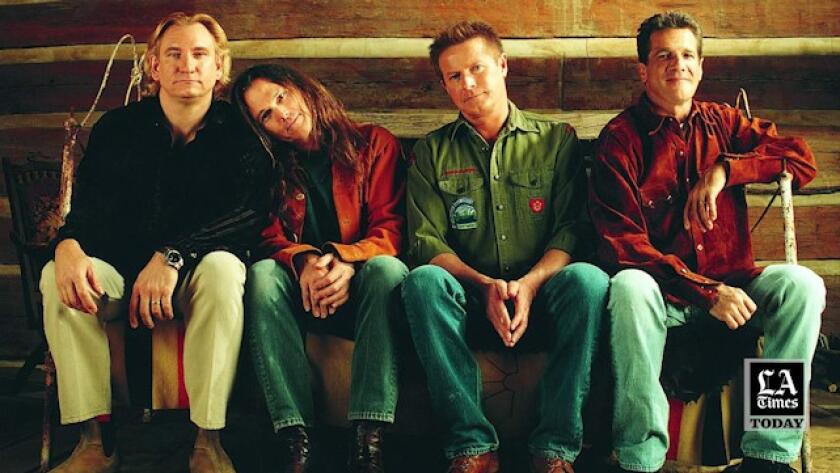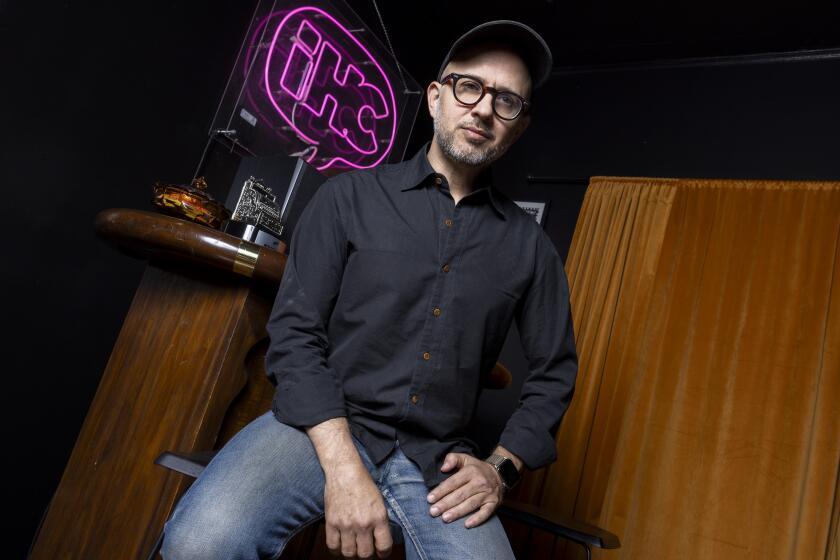Welcome to the ‘Hotel California’ saga: Missing lyric sheets, rare book dealers and a relentless Don Henley
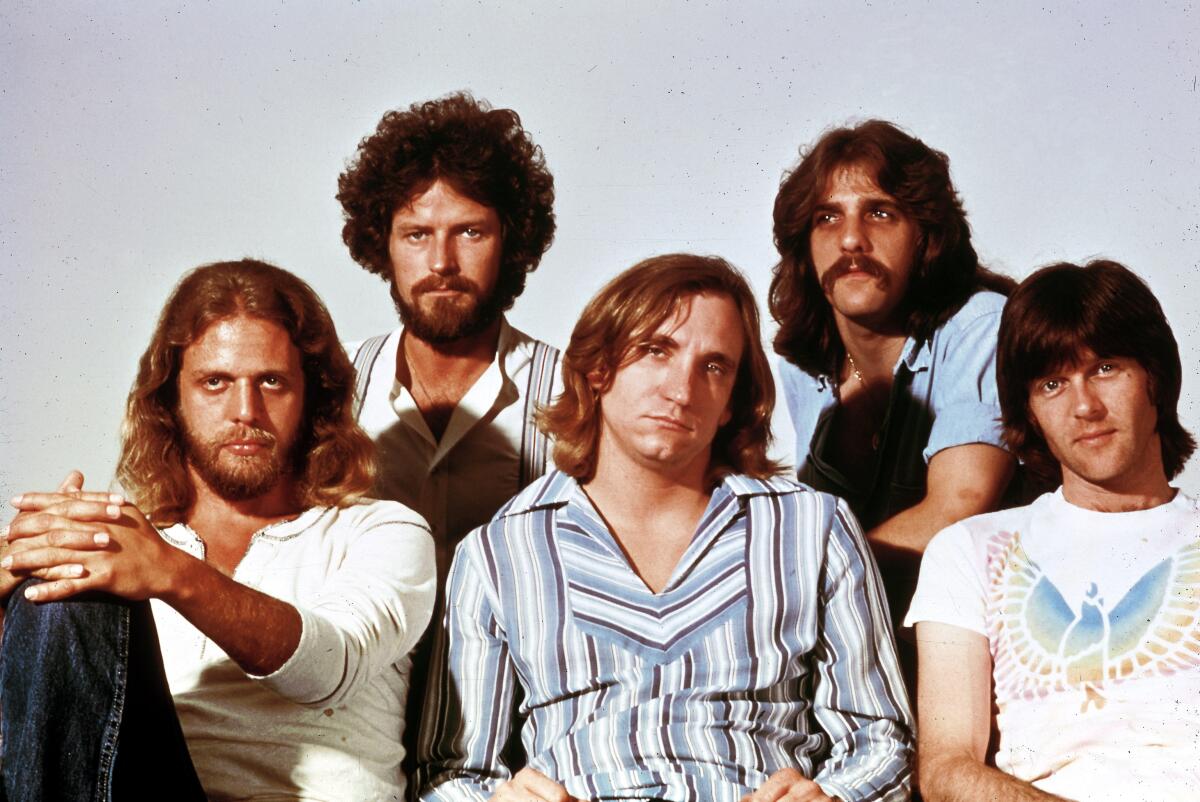
- Share via
In the late 1970s, Ed Sanders had a choice to make.
The writer and musician had earned a central place at the counterculture table in the 1960s, releasing influential work as a poet and publisher, as well as through his underground rock band the Fugs, but his book about the Manson murders, 1971’s “The Family,” brought him out of the underground and into the grisly mainstream. The increased attention led to offers for more deep-dive nonfiction work, and Sanders had narrowed the search for his next major project to be either an investigation of the 1978 Jonestown massacre or a band-commissioned biography of future Rock & Roll Hall of Famers the Eagles. He picked the latter. “I didn’t want to go down and smell those rotting bodies in the jungle,” he explained in a 1994 interview. “I did my spell in mass murders.”
The Eagles’ co-leader Glenn Frey had befriended Sanders when the writer was reporting “The Family,” so Sanders was given unprecedented access to the group just as the seams of it were beginning to tear. He spent years working on the book, which was to have been titled “This American Band — The Story of the Eagles.” By the time the four-volume text was finished, however, the band had broken up. In 1982, People magazine reported that Sanders’ “official saga” of the Eagles was still forthcoming, but eventually the decision was made to shelve it. “It’s a good book,” reflected Sanders in ’94. “It’s an exhaustive account.”
A decade later, in the mid-2000s, a rare book dealer, Glenn Horowitz, was presented with the opportunity to buy an item of great interest to music fans: Eagles co-founder Don Henley’s handwritten lyrics for much of the band’s landmark 1976 album “Hotel California” — including for “Life in the Fast Lane,” “New Kid in Town” and the album’s era-defining, Grammy-winning title song. Some of the lyrics were in draft form, offering a window into alternative versions of the songs, and some had notes and lyrics written by Frey as well. The pages served as one of the more significant finds in recent rock ‘n’ roll history, culturally and financially valuable in equal measure.
Live Nation has been repeatedly accused of failing to follow industry protocols for keeping concertgoers and performers safe, according to a Times review.
“Hotel California” holds the title of being the second best-selling studio album of all time, behind only Michael Jackson’s “Thriller.” But even with that statistic, its impact can still be underplayed. The fifth album of the Eagles’ storied, debauchery-filled run, “Hotel California” was the culmination of years of momentum they had been building, and served as the celebratory banquet for the entire Southern California soft-rock sound that they had adopted and perfected. (Henley and Frey were from Texas and Michigan, respectively.)
“I’ve learned over the years that one word, ‘California,’ carries with it all kinds of connotations, powerful imagery, mystique, etc., that fires the imaginations of people in all corners of the globe,” Henley explained in a 2016 interview with Rolling Stone. He told of a time when he was in “a remote village in a mountaintop jungle in Honduras,” without plumbing or electricity, and a local approached to show his “Hotel California” tape. “The song got around,” Henley said.
Today, 45 years later, Henley and the Eagles are hopscotching the country, playing the album in its entirety to sold-out arenas, in a multi-year tour that could likely continue indefinitely, if they wanted it to. When he sat down to write the words for the album on yellow notebook pages (based on concepts developed between him and Frey), it was a moment that changed the course of popular music.
What happened to those pages between 1976 and 2019 is the focus of an indictment handed down last month by Manhattan Dist. Atty. Alvin Bragg, in which three prominent figures in the entertainment artifact world — Horowitz, Edward Kosinski and Craig Inciardi — were charged with crimes related to their alleged efforts to sell the “Hotel California” lyric sheets.

“The manuscripts were originally stolen in the late 1970s by an author who had been hired to write a biography of the band,” reads the D.A. office’s press release summarizing the indictment. “Despite knowing that the materials were stolen, the defendants attempted to sell the manuscripts, manufactured false provenance, and lied to auction houses, potential buyers, and law enforcement about the origin of the material.”
Horowitz, who, according to the D.A.’s office, purchased the documents from said author in 2005, has been charged with conspiracy, attempted criminal possession of stolen property and hindering prosecution. Kosinski and Inciardi, who both subsequently allegedly purchased the manuscripts from Horowitz, are charged with possessing stolen property and conspiracy. All three pleaded not guilty, and their lawyers released a statement saying that “the D.A.’s office alleges criminality where none exists.” (The attorneys had no further comment.)
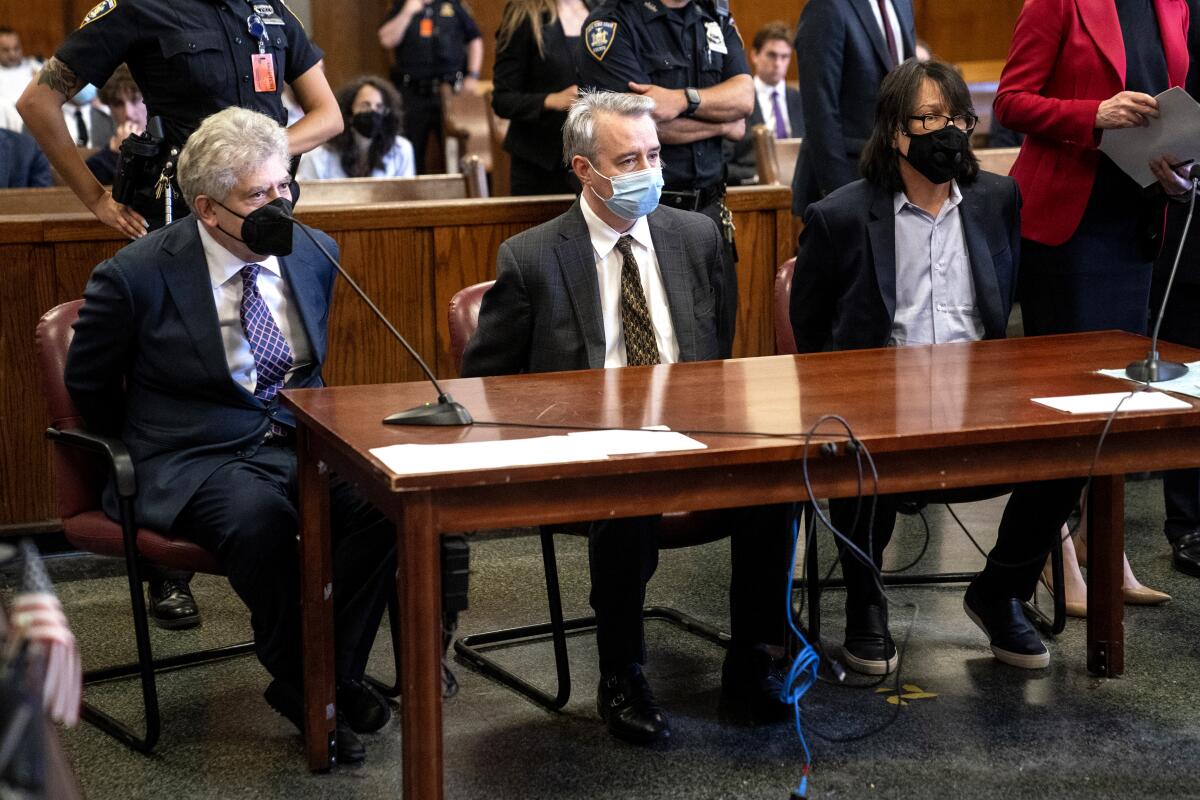
It’s a high-profile case that surprised people within the rare book and memorabilia world, partially because it’s typical for disputes centered on provenance — the history of an item’s ownership — to remain in civil litigation, rather than criminal. But it was also a surprise because of the caliber of the people involved — particularly Horowitz.
“I’m like, is that the Glenn Horowitz?” said Travis McDade, a professor at the University of Illinois College of Law specializing in rare manuscript theft, describing his first impression of the case. “Because he’s a big deal, especially when it comes to archive stuff. He sells high-profile archives to big institutions. He’s at the top of the game when it comes to that sort of thing.”
Horowitz, 66, has been a big shot in the rare book world for many decades, but really separated himself through his work arranging and placing, at various institutions for vast amounts of money, the literary archives of household names: Kurt Vonnegut, Joseph Heller, Gabriel García Márquez. His brokerage of Vladimir Nabokov’s estate in 1992 is said to have been the first of its kind to surpass $1 million, and, in 2016, he placed Bob Dylan’s archive for approximately $20 million. More recently, Horowitz was the dealer behind Eve Babitz’s archives landing at the Huntington Library, Art Museum and Botanical Gardens in San Marino. His fee reportedly ranges from 10% to 20%.
Inciardi, 58, is not famous like Horowitz, but his presence in this case is, to some, even more peculiar, due to his role as director of acquisitions at the Rock & Roll Hall of Fame, where he’s worked for nearly three decades.
“It’s unprecedented, in my experience, that someone who works for an institution is also dealing in this kind of material privately,” said a person with knowledge of the rare memorabilia industry, who spoke on the condition of anonymity due to the sensitive nature of the subject matter. “He’s been doing this for a long time. And no one could understand how somebody whose job it was to acquire things for an institution could be buying and selling stuff independently.” (When reached for comment, the Rock Hall provided a statement explaining that Inciardi had been suspended from his position and would remain so until the conclusion of an internal investigation.)
According to the indictment, Horowitz and Inciardi, along with Kosinski, 59, spent years working to sell the documents, splitting the 100 pages or so of the whole set — cited in the indictment to be worth over $1 million — into separate auctions at different institutions. The first instance was in 2012, when four pages of working lyrics for “Hotel California” were listed by Kosinski’s Gotta Have Rock and Roll auction house, which led to a communication with Don Henley’s attorney. Before long, a deal was arranged for Henley to purchase those pages for $8,500 — but a few years later, more pages were listed for sale by Sotheby’s, and another offer was sent to Henley to purchase some of them. That’s when things became far more antagonistic.
“[Longtime Eagles manager] Irving Azoff and Don Henley are the last people on Earth you would want to get into a fight with,” said the person with knowledge of the rare memorabilia industry. “Part of Irving’s reputation — and I think it’s something he takes great pride in — is being combative to the maximum. And Henley as well.” (Azoff and Henley declined to comment for this story.)
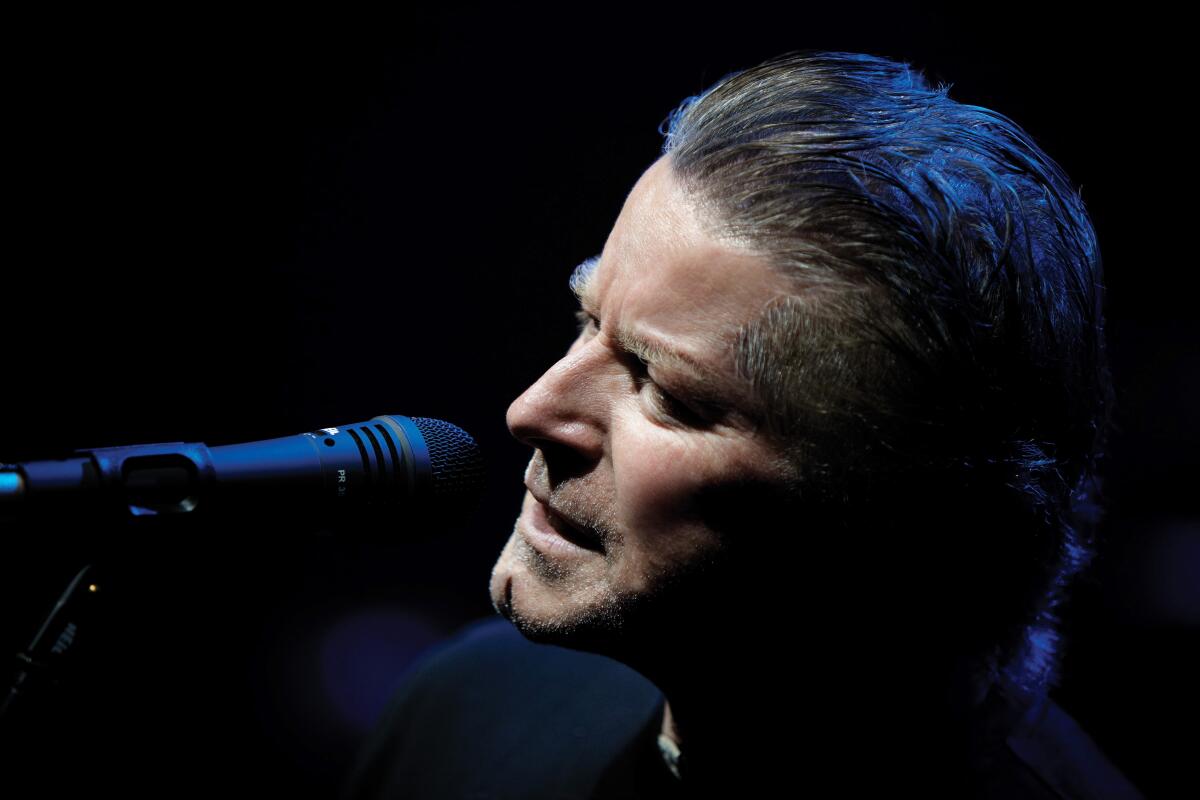
The list of previous legal disputes involving Henley, 75, is long and varied. Henley has battled with his former Eagles bandmate Don Felder, his record company Geffen Records and various other entities: In 2015, he used a lawsuit to remove an advertisement for a clothing company that jokingly used his name, and, in 2017, the Eagles filed a lawsuit against a Mexican resort calling itself the “Hotel California” in order to cease any implied association with the band. In 2011, when Frank Ocean included a reimagining of “Hotel California” on his mixtape “Nostalgia, Ultra,” Warner Music Group, the owner of the master track of “Hotel California,” threatened to sue if Ocean so much as performed the song in public. Henley later called Ocean “a talentless little prick.”
Given Henley’s track record, getting him to purchase back any of his own material was a surprising initial victory for the three dealers. But when an opportunity was subsequently offered to buy more pages piece by piece, Henley’s representatives instead “lodged complaints” with the Manhattan D.A., as a spokesperson for the D.A. explained via email. Because it was within the D.A.’s jurisdiction, the complaints led to an investigation.
The famously pugnacious music manager and live entertainment tycoon will be inducted into the Rock and Roll Hall of Fame on Saturday.
“One of the problems we see in the fine art world a lot,” said Katherine Wilson-Milne, an attorney specializing in art law and the co-host of “The Art Law Podcast,” “is that there’s no one in the current chain of the market that’s interested or benefits from finding out that there’s a problem. … [Henley is] a rare person who’s interested in kind of exploding the chain.”
As for the biographer referenced in the D.A.’s press release, they are not currently being charged for any role in the saga, and are referred to in the indictment only as “Individual 1.” But several people with knowledge of the case, speaking under the condition of anonymity, cited Sanders, now 83, as having been the author at hand — and interviews and research suggest that Sanders was the band’s only documented, authorized biographer in the late ’70s. Sanders did not return requests for comment, but there’s one bit of online evidence that further establishes his role. Using the Internet Archive to see how it appeared in 2016, Sotheby’s original online listing for an additional 14 pages of “Hotel California” lyrics describes the item’s provenance as follows: “Don Henley and Glenn Frey — Ed Sanders — Present Owner.”
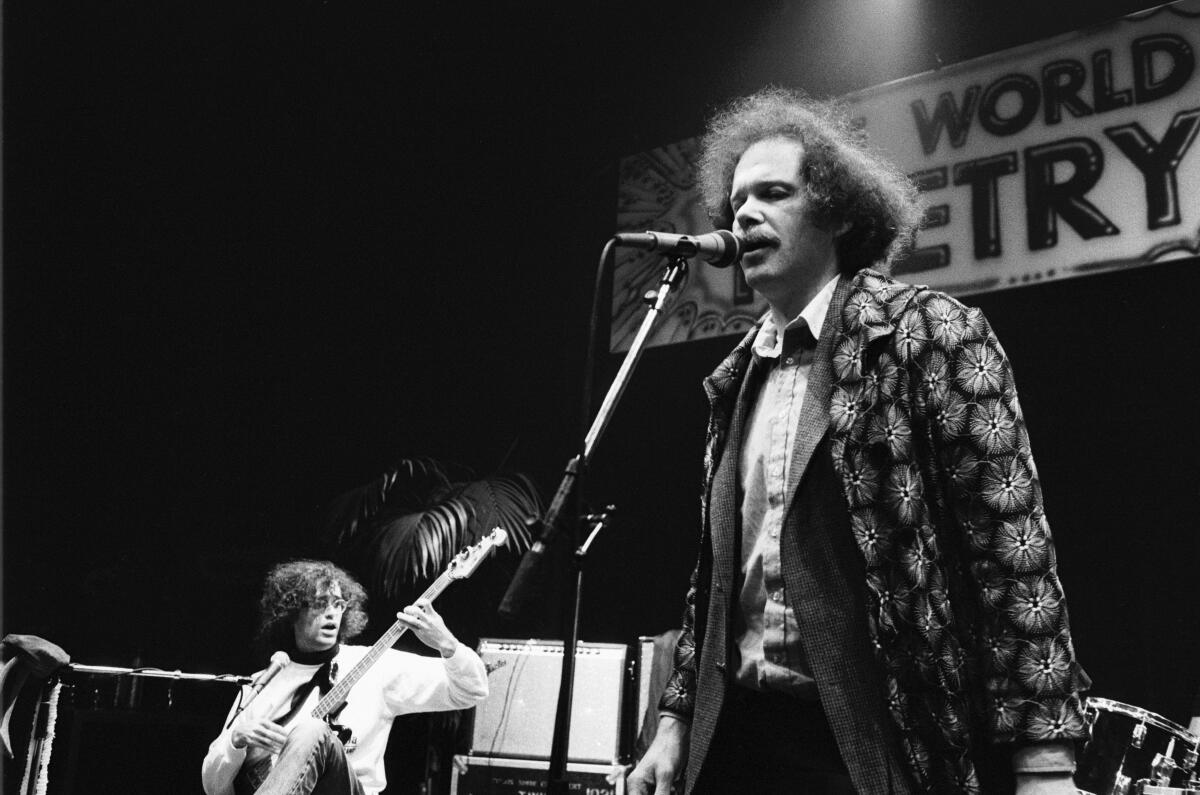
Who, exactly, the rightful owner is of the “Hotel California” papers is at the center of the case. In the indictment, the earliest description of how “Individual 1” ended up with the documents comes in the form of an email that person sent to Horowitz in 2005: “I was staying at Henley’s place in Malibu,” Individual 1 wrote in the email, “and had total access to his boxes of stuff, and there was a lot, and I compiled a box of files I wanted and his assistant mailed them to me.” Then, noting Henley’s propensity to be “aggressive,” Individual 1 suggested that “maybe we don’t want to sell them at all?”
In the years that followed, the details of this provenance appeared to shift with relative ease, often following overt suggestions and guidance by Horowitz and Inciardi, as documented in a chain of emails cited in the indictment. In 2012, for example, Inciardi sent an email to Horowitz in which he wrote out a script of sorts for Individual 1 to use, in order to claim provenance for the documents. “It was about 35 years ago and my memory is getting foggy!” Inciardi wrote in the voice of Individual 1. Then: “I remember finding the material discarded in a dressing room backstage at an Eagles concert.” Horowitz replied, “[Individual 1] won’t go for that. Let’s talk later.”
At one point, Horowitz noted in an email to Inciardi that Individual 1 was “almost ready to have his ‘explanation’ shaped in to [sic] a communication.” In 2017, after Frey’s death in 2016 at the age of 67, and as the D.A. was beginning to inquire about the documents, Horowitz wrote to Individual 1, “In an earlier communication you once suggested Frey was the person from whom you got the document. If Frey, he, alas, is dead and identifying him as the the [sic] source would make this go away once and for all. Your thoughts, please?” According to the indictment, after some back and forth, Individual 1 later sent an email that appeared to be a new declaration of provenance, pointing to Frey as being the provider of the lyric sheets.
“There’s a lot of good faith misunderstandings when it comes to collections sold by one person to another,” McDade, the specialist in rare manuscript theft, noted, speaking specifically about the detail of Frey being seemingly roped into this after his death. “I mean, that stuff happens. But this seemed to be a deliberate effort to obfuscate who the rightful owner was.”
For the first time ever, the Eagles played the “Hotel California” album in its entirety, after which they performed two-plus hours worth of hits.
This is not the first controversy involving Kosinski. In 2015, an arbitrator ruled against him for having cut out a client from the sale of high-value Michael Jackson memorabilia; the lawsuit filed to affirm the ruling states that Kosinski was ordered to pay over $600,000. He was also embroiled in a court battle with Madonna, who attempted to stop Gotta Have Rock and Roll’s sale of her personal belongings — including a letter written to her by Tupac Shakur — which had been provided to the auction house by Madonna’s former friend. A judge dismissed the case in 2018 partially because the statute of limitations to claim the items had passed.
As for Horowitz, a colleague of his said, in a 2007 profile in the New York Times, that Horowitz describes himself as a “terrific combination of a scholar and a grifter.” In a recent podcast appearance, Horowitz proudly confirmed his status as “notorious” in the industry.
“There is a bit of a black box involved in auction items that are in part valuable because they’re mysterious and elusive and exciting,” said Nick Rosenberg, one of the attorneys who won the Michael Jackson claim against Kosinski. “But that also provides a lot of opportunities for either genuine mistake or outright fraud. … It is a tough industry.”
Various factors — including the rise of both baby boomer-era nostalgia and a boomer class of high-end investors — have driven an exponential growth in the value of rock ‘n’ roll memorabilia. In April 2020, Paul McCartney’s “Hey Jude” lyric sheet was sold by Julien’s Auctions to an anonymous buyer for $910,000; a few months later, Julien’s sold Kurt Cobain’s guitar from the “Unplugged” concert for $6 million to Peter Freedman of Rode Microphones. “The biggest reason that this market has exploded,” Darren Julien, the CEO of Julien’s, recently told the Journal of Antiques and Collectibles, “is due to the hedge funds and financial institutions who are looking at rock and roll historical artifacts as blue chip investments and a way to diversify their portfolios.”
“Rock ‘n’ roll memorabilia is exciting, it’s fascinating, it’s desirable,” said Rosenberg, the attorney. “I think that we end up placing a lot of false comfort at times in the purported provenance of the item or in our general desire to trust established entities.”
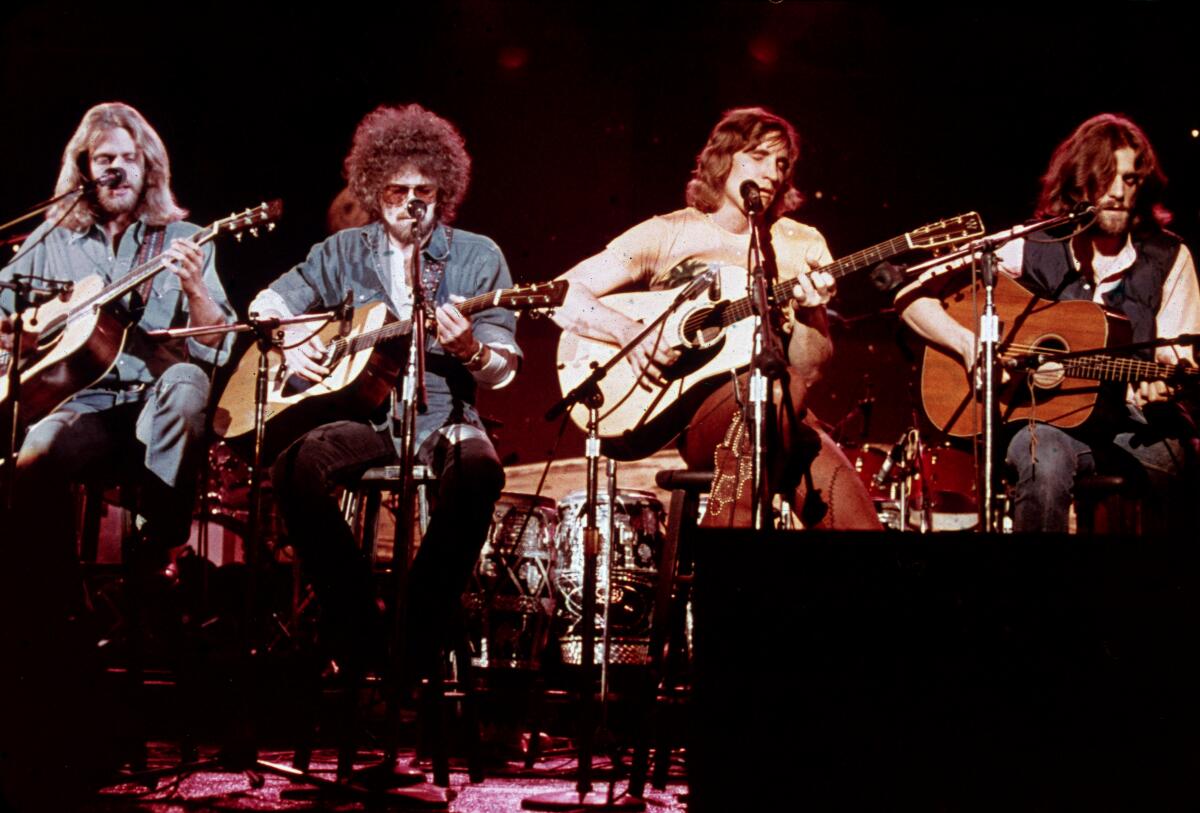
If the Eagles case reaches trial, the D.A. will presumably have to demonstrate beyond a reasonable doubt that the items were stolen in the first place, which may be tricky. “You gotta have proof — you have to have a real police report,” said Pete Siegel, Kosinski’s former partner for over 15 years. (Siegel is not named or implicated at any point in the indictment.) “And as far as Henley, I think he [filed a report] much after the fact.”
The D.A.’s press release seems to confirm this timeline, saying that, after Henley learned that Inciardi and Kosinski were attempting to sell portions of the documents, the Eagles’ drummer “filed police reports, told the defendants that the materials were stolen, and demanded the return of his property.” A source with knowledge of the filings said that Henley filed police reports with the Los Angeles County Sheriff’s Department in April 2012 and June 2014.
If Horowitz is convicted, he does not face mandatory prison time, but his sentence could range from five to 15 years in prison, according to the D.A. spokesperson. If Kosinski and Inciardi are convicted, they face a minimum of one to three years in prison and a maximum of 8.3 to 25 years. In the event of a conviction, the “Hotel California” papers would be returned to Henley, and, if he wanted to, he could still theoretically pursue a civil case as well.
One consideration several people highlighted is that money probably wasn’t the main motivating factor for any of the dealers implicated in the “Hotel California” scandal. All three had established successful careers, and Kosinski is married to a New York real-estate heiress, Jacqueline LeFrak. “[Kosinski] doesn’t need the money,” Siegel said, defending his former partner. “If he sold it at auction, you’d make, let’s say, 50 grand maybe? … If he believed Henley was telling the truth and had documentation, Ed would be the first one to give it back.”
If it wasn’t the money, what pushed Horowitz, Inciardi and Kosinski to go to such lengths to allegedly sell the “Hotel California” papers, despite hurdles facing them at every turn?
Margaret Barrett, a freelance consultant specializing in pop-culture memorabilia, thinks it could be the mystique of the item — the allure of playing a role in a new chapter about one of the most fabled entries in the American songbook. “[‘Hotel California’ is] huge,” Barrett said. “Everyone knows that song, and this is why it’s gotten to this level.”
Barrett brought up the example of the handful of surviving pairs of Judy Garland’s ruby slippers from “The Wizard of Oz,” which have been a ceaseless source of fascination in the collecting world — and at one point were the focus of an FBI investigation to track down a stolen pair.
“It’s just these shoes,” Barrett said, “that have captured the public’s imagination — mainly the American public. And people get consumed, and will do things about, through, for, [and] with them that they wouldn’t ever do otherwise, because they have some kind of magic — magic that we prescribe to it. But it’s still magic.”
- Share via
Watch L.A. Times Today at 7 p.m. on Spectrum News 1 on Channel 1 or live stream on the Spectrum News App. Palos Verdes Peninsula and Orange County viewers can watch on Cox Systems on channel 99.
More to Read
The biggest entertainment stories
Get our big stories about Hollywood, film, television, music, arts, culture and more right in your inbox as soon as they publish.
You may occasionally receive promotional content from the Los Angeles Times.

